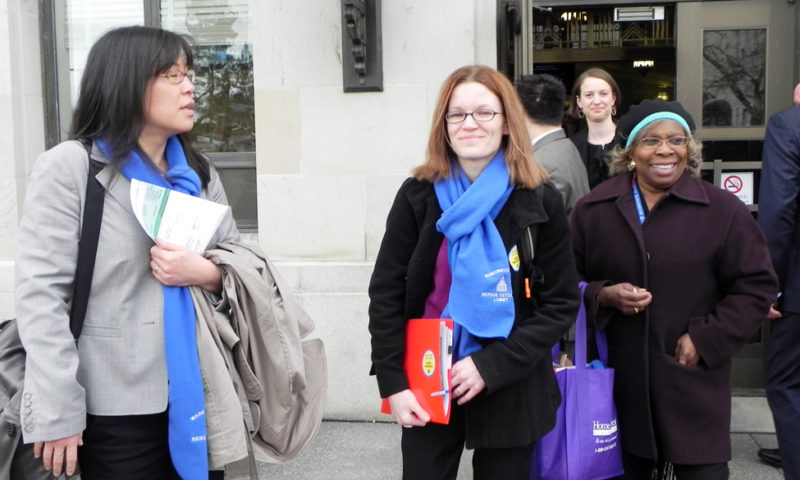
Over 300 people packed the pews of United Churches in Olympia on Feb. 23 to hear the governor, legislators and advocacy groups pledge their support and offer a sounding board for senior programs and concerns. Pamela McCarty, a union member with Service Employees International Union (SEIU) 775NW, joined other purple shirted union members in her pew because, “I do everything I can to support seniors. Talking to the legislators is one of the most important things I can do.â€
Seniors are by far the largest voting sector. Yet time and time again when it comes to budget crunches senior services repeatedly go on the chopping block. Those services aren’t limited to federally funded Social Security and Medicare programs. In Washington state, senior services include everything from transportation to foot care to meals. That’s due to a little known act passed in 1977 called the Senior Citizens Services Act (SCSA). Initially created in response to the high number of individuals residing in nursing homes to offer them an option to stay at home, the SCSA leverages state funds so that for every dollar the state chips in, seniors receive about $7 in services.
In 1995, 88 people lived in nursing homes for every 1,000 residents (17,000 people in nursing homes).  Projections at that time indicated that by our current population, Washington state would need beds for 26,000 individuals. A recent report puts our current nursing home number at 10,800. To put that in financial terms, in 1995, 45 percent of Medicaid spending for long term care went for nursing home care. Today that number is only 21 percent. Home care saves the state roughly two-thirds the cost of nursing home care, a savings of over $1 billion over the last decade.
“Since the recession began in 08, we have been in a no win situation,†said Gov. Chris Gregoire. “When you have a recession like what we’ve experienced, the demand for social services automatically goes up. At the same time, our revenue dramatically goes down. Medicaid costs alone have gone up 23 percent. Our Medicaid inflation rate is just over 2 percent. The rest of the states in the nation are experiencing around 8 percent. Still you can’t absorb that kind of inflation when your revenues are going down. We have cut more than $500 million in long term care and DD (developmentally disabled services).â€
Many of those cuts have meant increased long term costs to the state, what one audience member called “volunteer drivers versus taxis†referring to the elimination or extreme cuts to volunteer chore programs and transportation options that have forced the state to pay for much costlier programs. “To say that we have not cut enough when I think we have now cut to the core of what is the fundamental responsibility of state government,†said Gregoire who disputed those who say the state needs to make more cuts.   “A budget is a document of values. It’s not a document of numbers. We cannot cut and cut and cut and leave our safety net frayed. If you cut mental health today, the consequence will be that we have to pay much, much more down the line.â€
It was Mattie Lou Bell’s second time coming to Senior Lobby Day. She serves on Pierce County’s ADRC (Aging and Disability Resource Center) Advisory Council where she’s been a board member for three years. Bell traveled the capitol campus with Cina Case, a UWT student who serves as a Pierce County Long Term Care Ombudsman volunteer and case management intern and Nellis Kim, Pierce County’s Long Term Care Ombudman and only paid staff for Pierce County. They spoke with Representative Bruce Dammeier (R) and Sarah Pollock, Legislative Assistant to Representative Hans Zeiger (R) both of the 25th District, to thank them for supporting senior programs and to reiterate the importance of two programs that have recently been hit hard with cuts: the Ombudsman program and Adult Day Health.
Dammeier agreed, saying “as the minority party sometimes the challenge is how you best influence.â€Â The House Republican Party had just the day before preserved those programs in their budget.
Kim pointed out with the recent Pierce Transit cuts, 700 people with disabilities lost access to transportation.
According to Dammeier the legislators use a term “decimal dust.â€Â This refers to inconsequential numbers, in this case money. Usually that number is around $1 million but this year it refers to $10,000. “Our priorities are education, public safety and the most vulnerable (includes children and seniors).â€
At Zeiger’s office, Kim pointed out that an additional 20 percent cut in budget effectively cuts the program by 50 percent.
“The primary goal of the program is to keep people in their own home for as long they can,†Kim reminded Pollock.
“It’s not just senior citizens,†Case inserted. “It includes 18 plus (adults).â€
“Some of those programs are vital for those people that can no longer use public options,†said Kim. “Unfortunately, (losing those options) does end up tipping some of those people (to) where there’s no options.â€
In Representative Tami Green’s (D) office, a small contingent of Community Connections, Community Resources and ADRC volunteers and employees were pushing the same message to a receptive audience. Green, a registered nurse who works with mentally ill adults and children agreed that additional cuts to programs “will save you money but it’s going to cost you money.â€Â She pointed out that Sea Mar estimates that as much as 80 percent of their clients have major health issues. “You walk down Tacoma Avenue and you see an interesting mix of folks who just fell through the cracks. If you look at the disabled population, the highest percentage of people on disability are the mentally ill.â€Â She emphasized that mental illness is not a character flaw. “I get frustrated about the mental health issue in that with this much work (she held two fingers about an inch apart) you get this much help (held arms out).â€
Contact your legislator here.
[nggallery id=8]
